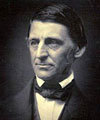 |
Ralph Waldo Emerson (1803 – 1882) American essayist and leading transcendentalist. Famous poems include: Brahma, The Rhodora and Give All To Love |
“Give all to love;
Obey thy heart;
Friends, kindred, days,
Estate, good fame,
Plans, credit, and the muse;
Nothing refuse..”
– R.Emerson
Ralph Waldo Emerson
Emerson, Ralph Waldo (1803-1882), American essayist and poet, a leader of the philosophical movement of transcendentalism. Influenced by such schools of thought as English romanticism, Neoplatonism, and Hindu philosophy. Emerson is noted for his skill in presenting his ideas eloquently and in poetic language.
Emerson was born in Boston, Massachusetts. Seven of his ancestors were ministers, and his father, William Emerson, was minister of the First Church (Unitarian) of Boston. Emerson graduated from Harvard University at the age of 18 and for the next three years taught school in Boston. In 1829 he became minister of the Second Church (Unitarian) of Boston. That same year he married Ellen Tucker, who died 17 months later. In 1832 Emerson resigned from his pastoral appointment because of personal doubts about administering the sacrament of the Lord’s Supper. On Christmas Day, 1832, he left the United States for a tour of Europe. He stayed for some time in England, where he made the acquaintance of such British literary notables as Walter Savage Landor, Samuel Taylor Coleridge, Thomas Carlyle, and William Wordsworth. His meeting with Carlyle marked the beginning of a lifelong friendship.
On his return to the United States in 1833, Emerson settled in Concord, Massachusetts, and became active as a lecturer in Boston. His addresses included “The Philosophy of History,” “Human Culture,” “Human Life,” and “The Present Age”‘were based on material in his Journals (published posthumously, 1909-1914), a collection of observations and notes that he had begun while a student at Harvard. His most detailed statement of belief was reserved for his first published book, Nature (1836), which appeared anonymously but was soon correctly attributed to him. The volume received little notice, but it has come to be regarded as Emerson’s most original and significant work, offering the essence of his philosophy of transcendentalism. This idealist doctrine opposed the popular materialist and Calvinist (see Calvinism) views of life and at the same time voiced a plea for freedom of the individual from artificial restraints.
Emerson applied these ideas to cultural and intellectual problems in his 1837 lecture “The American Scholar,” which he delivered before the Phi Beta Kappa Society of Harvard. In it he called for American intellectual independence. A second address, commonly referred to as the “Address at Divinity College,” delivered in 1838 to the graduating class of Cambridge Divinity College, aroused considerable controversy because it attacked formal religion and argued for self-reliance and intuitive spiritual experience.
The first volume of Emerson’s Essays (1841) includes some of his most popular works. In the interval between the publication of these two volumes, Emerson wrote for The Dial, the journal of New England transcendentalism, which was founded in 1840 with American critic Margaret Fuller as editor. Emerson succeeded her as editor in 1842 and remained in that capacity until the journal ceased publication in 1844. In 1846 his first volume of Poems was published (dated, however, 1847).
Emerson again went abroad from 1847 to 1848 and lectured in England, where he was welcomed by Carlyle. His Journals give evidence of his growing interest in national issues, and on his return to America he became active in the abolitionist cause, delivering many antislavery speeches.
Emerson is remembered as one of the leading thinkers and poets of the transcendentalism movement. He remains one of America’s most popular poets.
Selected Ralph Waldo Emerson Poems
- Brahma
- Celestial Love
- Concord Hymn
- Fable
- Fate
- Forebearance
- Give All To Love
- Good-by
- Loss and Gain
- Ode To Beauty
- The Sphinx
- The Amulet
- The Rhodora
- The Snow Storm
- The Visit
- The World-Soul
- Two Rivers
- Uriel
Emerson Links
- Emerson Poems at Poetseers
- Emerson Quotes at Poetseers
- Appreciation of Emerson – Talk on Emerson and Emerson’s poetry by Sri Chinmoy
- The Works of Ralph Waldo Emerson
- Ralph Waldo Emerson– Website on transcendentalism with information and links about Emerson
- Early American Poets
